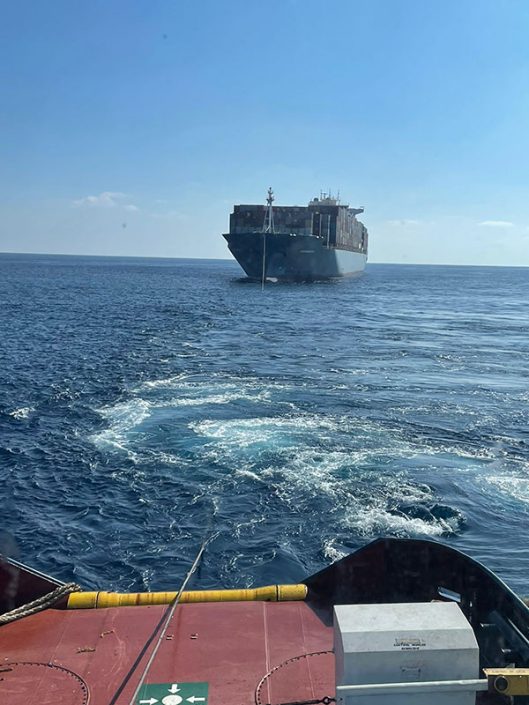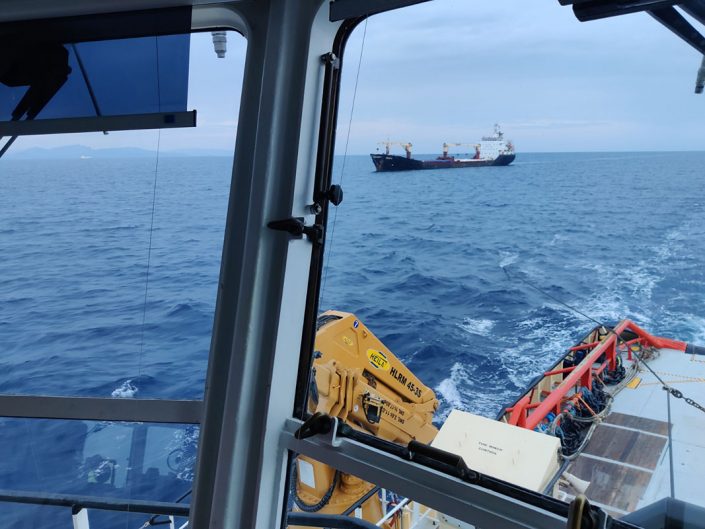Salvage Operations 2024
You can scroll down to view details and photos of the operations.
LOF dd 09/03/2024
STEEL C
On 9th March 2024, bulk carrier “STEEL C” (63,000DWT, built 2015) in ballast, run aground in Uruguay River. Owners signed an LOF with Five Oceans Salvage who immediately dispatched a local Salvage Master while mobilising a salvage team under a Senior Salvage Master from Greece and local tug PORTOBELO from Nueva Palmira. All necessary formalities to obtain the refloating operation permission were complied with by the local Salvage Master. A deballasting sequence was worked out by the Senior Salvage Master and implemented onboard pending the arrival of the team from Greece. Upon their arrival onboard, the Senior Salvage Master took over and successfully refloated the vessel later in the day. The vessel was redelivered to her owners in the afternoon of the 10th March.
LOF dd 05/02/2024
ALKIVIADIS
On 5th February 2024, motor tanker “ALKIVIADIS” (50,000DWT, built 2023), laden with diesel oil from St Petersburg to Ghana, experienced propulsion issues in the Baltic. The vessel managed to reach Gotland Island, Sweden at very low speed and anchor off port limits in international waters. A brief underwater inspection showed that the vessel had sustained propeller damages and was unable to proceed any further under her own power.
On the 6th of February her owners signed a LOF with Five Oceans Salvage. A Salvage Master was mobilised from Greece to join the tug while a Senior Salvage Master was sent to Sweden to standby to liaise with any Authorities needed, to support an STS or other application. Albeit carrying a legitimate cargo sold under a price cap and not subject to OFAC sanctions, the ALKIVIADIS and her cargo were still subject to the European restrictions relating to Russian price capped cargo that significantly hindered the operation. Repairs to the propeller in dry dock were impossible with the cargo onboard, while repairs or other works afloat could not be done as the casualty had to be kept off European territorials and any subcontractors, workshops etc were banned to work onboard under the European restrictions.
The salvors’ initial intention was to transship the cargo for delivery to destination and then tow the vessel to a suitable repair facility as this seemed the only option under the circumstances. However, this option also turned out to be impossible due to the European restrictions. Authorities refused to cooperate and sub-contractors were unwilling to work with a Russian cargo, regardless of whether sold under the price cap. Finding a tug alone was quite a task. Salvors initially fixed the port tug RADUGA SIRIUS from Tallinn to mobilise and standby the casualty until enquiries about the STS possibilities were made. This was the only tug on offer out of the 65 companies approached in the broader region.
Over the course of the following days salvors enquired for an STS permission with all Baltic States and beyond, all the way to Gibraltar. The only place that would accept the vessel for an STS was Gibraltar but even so, there was no STS service provider willing to do the STS operation. With the towage to destination being the only option, and the availability of repair options for the vessel in West Africa, arrangements were made for the long towage from Sweden to Ghana. Salvors contacted all tugowners with an ocean going fleet in the region and again received very limited response. Tug PEGASUS was fixed from Holland and with the assistance of RADUGA SIRIUS and two other port tugs that came from the Netherlands and Germany, safely towed the vessel out of the Danish Straits in very bad weather.
Once in the North Sea, the PEGASUS resumed the towage to West Africa on her own. The entire towage operation until Gibraltar was slow and difficult, in very bad weather. Additional tug assistance was also engaged from Rotterdam briefly, to safely cross the Dover Straits. The convoy, under the guidance of the Salvage Master onboard and with the assistance of a weather routing service, had to regularly adjust course and speed, deviate or seek shelter, to maneuvre around, wait out or cross the bad weather with safety. Due to the slow progress of the towage, the PEGASUS had to be replaced due to dry docking arrangements. The ocean going tug ASSO VENTINOVE was mobilised from Malta to meet with the convoy and take over the tow off La Corunna, Spain. In the meantime, cargo interests nominated Dakar as their preferred destination and arranged for a suitable vessel to receive the ALKIVIADIS cargo by STS. Salvors made the necessary arrangements with local STS contractors.
The STS permission was granted by the local Authorities and the convoy arrived off Dakar on 26th March having completed a towage of over 3,500 nautical miles. Following the provision of the necessary salvage securities, the STS was safely and successfully performed and all services under the LOF were completed on the 6th of April when the vessel was redelivered to her owners, free of cargo, at Dakar Inner Anchorage.


